FALKIRK COMMEMORATION 2011 |
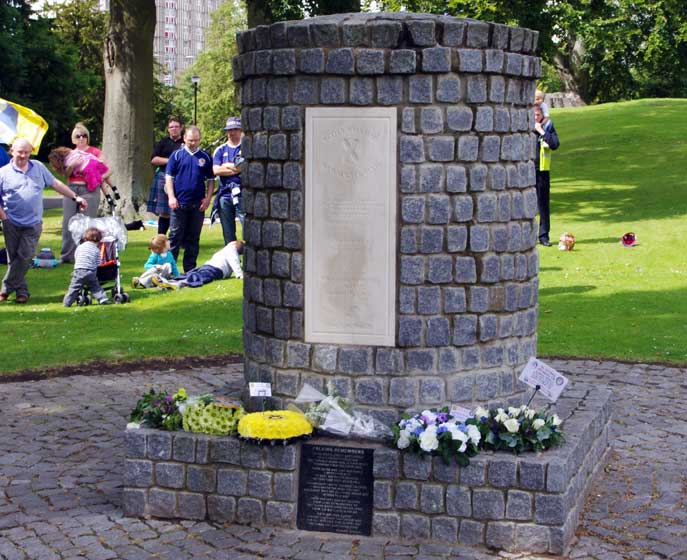 |
The Falkirk Commemoration 2011 took place on Saturday the 16th of July this year and was very well attended by people of all ages. Around 150 patriots marched down Falkirk High Street behind the magnificent Tulliallan Pipes and Drums Band who were drafted in at short notice, well done guys. Along the way the march swelled with excited locals joining the march down to the memorial cairn at Callender Park. It was great to see so many different flags and banners on the march which represented so many different groups joining together for the same cause, always brilliant to take part in events like this, joining the Society were The Fellowship of the Thistle, Siol nan Gaidheal, The Strathleven Artizans, Na fir Dileas, The Knights Templar, Camelon History Society, The SNP and The men of Bute. Ken Shirra started of with a benediction which was followed by the raising of the Saltire by Ewan Lawson from New Zealand. After a prayer of remembrance, first speaker up was Sarah Crome who after a fine speech actually apologised for the actions of her fellow countrymen under Longshanks. Well, it takes a lot of guts for an Englishwoman to do something like that in front of a partizan crowd and Sarah, I have to say you didn't have to do that but a lot of people were won over to your side on that one. We then had a medley from The Tulliallan Pipe Band followed by our second speaker Alistair Scott-Stewart (Big Appin) of The Fellowship of the Thistle who gave a rousing speech/rant about our need to join together in the interests of Scotland as a free and independant nation. This fine speech was followed by the wreath laying ceremony by representatives of all the groups, the honour of laying our wreath this year fell to Mike and Cameron Smith and a fine job they did too. This was followed by a minutes silence and a lament from Chris the NFD piper. Last up to speak was last minute draftee Dick Bird from the SNP who gave another fine speech. The ceremony closed with myself leading the assembled crowd in a rendition of 'Scots Wha' Hae' and the Retiral of the sword as a cross. Ken then gave a final benediction and we retired to the Cladhan Hotel for a couple of hours refreshment and craic. At The evening do in Camelon bowling club the audience were treated ( we think, lol ) to a few songs from Kate and I to start the proceedings, before the amazing Fiery Jack ripped the roof off with a storming set followed by pies, beans, and stovies to fortify the hungry (Sir Thomas Randolph). The evening was rounded off with a raffle and another cracking set by the Fieries. All were agreed that it was a great day and night out. Roll on next year! Our thanks to Gordon Aitken and The Strathleven Artizans for this report. |
.jpg) |
Wallace Society on the march, thanks to Fellowship of the Thistle for this photo |
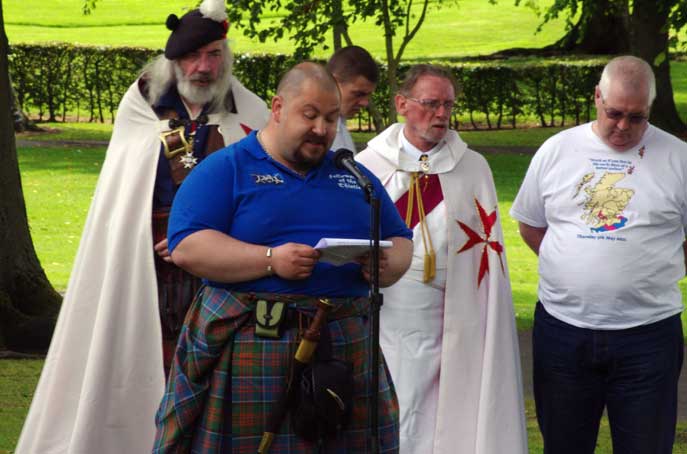 |
Alistair Scott Stewart probably made the speech of the day, here it is in all its glory It always amazes me how history appears to repeat itself. Whether it is coincidence or our inability; as a people to learn from our mistakes - we may never know. Yet again I see it happening. As all are aware, before Wallace’s forces suffered defeat here in Falkirk. A great victory was won for Scotland, by her people; at Stirling Brig. To put a modern spin on those events, only 2 months ago the people of Scotland once more won a victory for our country, with the great political battle of the Scottish election. The mood is still jubilant and the people are optimistic, yet our battle of Falkirk has appeared upon the horizon, ever getting closer… whether Scotland wins or looses us up to all of us. It has been said at recent events that there is a need of the continued unity being experienced by the various patriotic groups. I say this is not so, the false shows of unity are as transparent as crystal. If we don’t cease to bicker about who is right and wrestle for the illusion of power, then our cause will surely shatter as easily as the toasting glass cast upon the fire. Why are we here today? For some it is to remember the past, the sacrifice of brave patriots. For others it is about the present, and a way to express there patriotism. But surely, we are all here for the love of Scotland….. Our Scotland…. All of us here today, have different ideologies, and we apply different strategies and methods to try and achieve this…. Yet do we not all wish to work towards Scotland's freedom? Could this one common ideal be enough to unify us? It is said, that there are many paths that lead to the top of a mountain, yet once there the view is the same, no matter which path you followed. We all follow our own paths to the same goal, no one has the right to judge who is right or wrong… else you deny that person their freedom.. How can we ever be a free nation again, if we continue to oppress one another? We must all learn to embrace the diversity and individuality of our great nation, allow freedom of thought and speech. We don’t have to like each others view points, but we should at least respect their rite to think that way, lest we loose that rite ourselves. Today, under the gaze of past patriots, hero’s of Scotland, let us draw a line under all that has happened in the past…. Let us go from here to work for the good of Scotland in our own unique ways…. Let us leave behind the petty jealousy and laughable vendettas. Let us move forward as Legion… many but with one purpose… The freedom; of our beloved Scotland, and all her children |
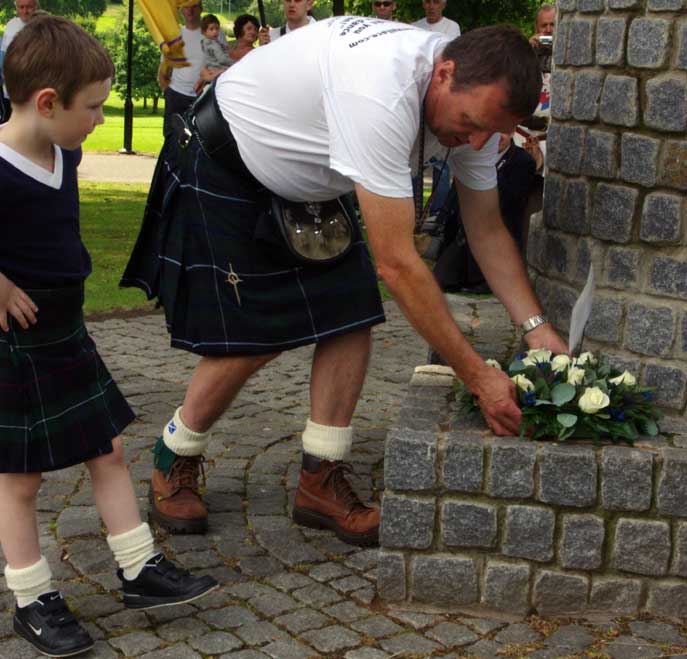 |
Mike and Cameron lay the Society Wreath |
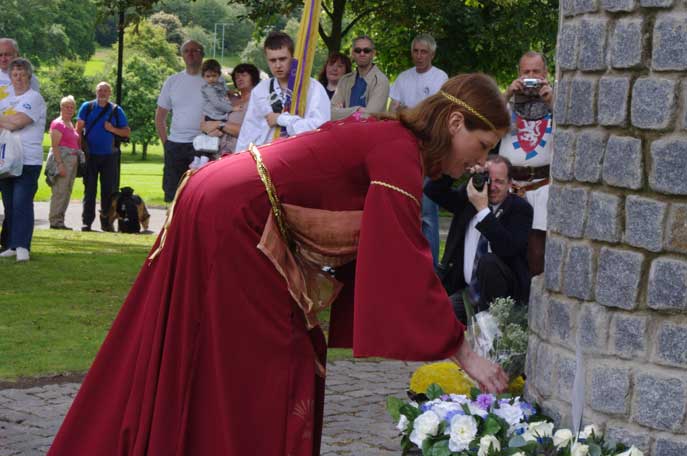 |
Sarah Crome laying some flowers, Sarah was also one of the guest speakers, here's her speech. There are many questions about the battle of Falkirk for which we don't have the answers. Why did Sir William stand his ground here at Falkirk? Wasn't he exposing his forces to the mercy of the Welsh longbow? Would he have fared better with Andrew de Moray at his side? Their tactics at Stirling Bridge had been perfectly executed but sadly Andrew was mortally wounded. Could he have won with more support from the nobles? England's army was starving and divided – King Edward had been badly injured by his horse and the omens were not good for the English army. So how could Wallace fail? This is all conjecture, because unfortunately for Wallace, he had to face King Edward I in person – the most formidable opponent in medieval Christendom – injured as he was. This was something that not even Robert the Bruce had to endure, and who knows how King Robert would have fared at Bannockburn had HE had to face Longshanks there rather than the inept Edward II. And one thing is for sure, Longshanks made more use of his deadly longbow here at Falkirk than his son did at Bannockburn. It wasn't the the charge of England's heavy cavalry which broke down the schiltrons, but the hail of fatal arrows. As we know, once this deadly weapon was effectively brought into play, it was game over for the opposing side. And though we see the common man who fought with Wallace as willingly fighting for their freedom – and that is true, but don't forget that in order to assert himself as Guardian he introduced conscription. As well as that, he completely changed the structure of command, calling on his classical education and resorting to the Roman chain of command. For many of his feudal superiors, this was more than they could stomach. We rightly criticise the nobles of the day for not respecting Wallace's position as Guardian and we are told that the Scots cavalry, led by nobles, deserted Wallace here. There is no doubt that he was badly let down by them on this day, but I wonder to what extent they fled in panic rather than deliberate desertion? Controversial, I know. But there were those who bravely stood their ground such as Sir John Stewart and Sir John Graham. And as the battle unfolded where was Robert the Bruce? Most of us are familiar with Braveheart the writer of which clearly drew inspiration from Blind Hary – and I seem to spend a lot of time saying 'Braveheart...... what fantastic film that is …... however!' We all understand the need to exaggerate or distort the truth in order to create good drama. But in doing so you sometimes destroy reputations. Bruce was used to make a point about betrayal at the Battle of Falkirk – a betrayal which never actually happened. When I saw this for the first time, I put my head in my hands and I thought.....'Whatever his faults, please don't use him in this way'. There are no contemporary records of Bruce fighting for the English at Falkirk – and I think we would know about it if he had been there. What we do know is that despite victory in this battle, the English campaign of 1298 failed and Edward's army returned home starving. Bruce was instrumental in fighting them off as they retreated through his lands around Carrick and Ayr. The first question most people ask about any battle is 'who won?' If you look at battles in isolation this is the most important answer. And whether we are English or Scots, we see it as some sort of score. But it's the big picture that matters and so many lessons were learnt from Falkirk – Wallace's stance was defensive – his army stood it's ground. But this wasn't enough and at Bannockburn, Bruce learnt that to win you had to attack – so drawing inspiration from Wallace's schiltrons which were stationary, King Robert made his formations move – and - he kept his eye out for those formidable longbow – which, lucky for him, didn't materialise until the final stages of the battle. We know that Wallaces position as leader depended on his continued success and that after this battle, it was no longer possible for him to remain as Guardian. We also know that he would never stop fighting for Scotland and that this commitment continued until the day of his brutal execution. And it didn't end there, as those that came afterwards continued the fight and won. There are those people in both our countries who would have us believe that blame for the Wars of Independence lies with those Scots who fought amongst themselves for power or for the throne. But make no mistake about who started this – Edward I was the ultimate master of divide and rule, even in countries that did not belong to him and where he had no right to do so. So, I would like to end (not with Edward I this time – put your pistol away Gary!) but with an apology! There are those of us in England who are genuinely sorry for the behaviour of our forebears – even though we recognise that we are not personally responsible – but that our nation and her king was. And there would probably be more recognition, if more people knew the full story – maybe thats the reason we aren't taught about the expansionist wars of Edward I in the 13th century – wars that effected all the nations within this islands. And it seems to me, therefore, that we are in denial. If we choose to re-write or ignore the stories of our past, we can't expect to get on with our neighbours. If we accept them, then I am sure we would earn your respect and learn to get on together in the future. |
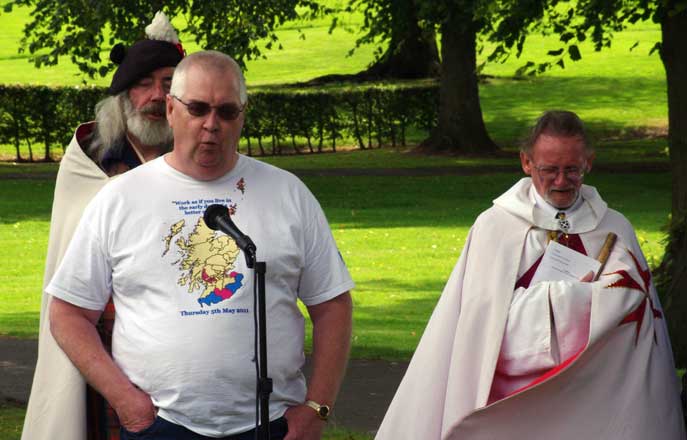 |
Dick Bird from the SNP |
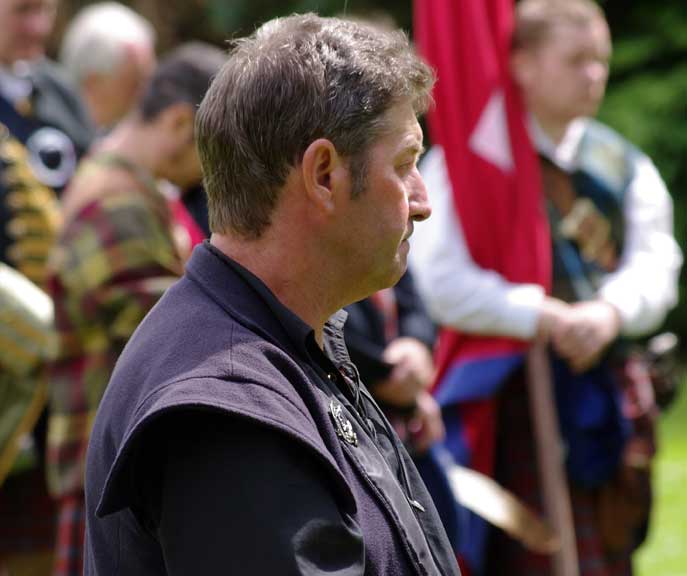 |
Duncan, Society Convenor |
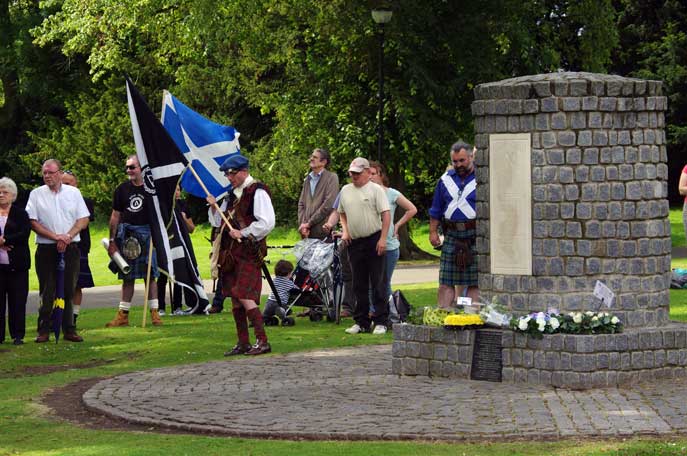 |
Gary at the Cairn |
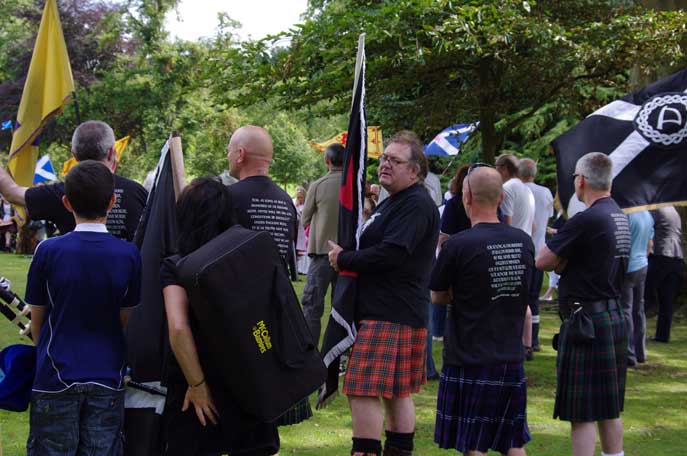 |
Siol nan Gaidheal |
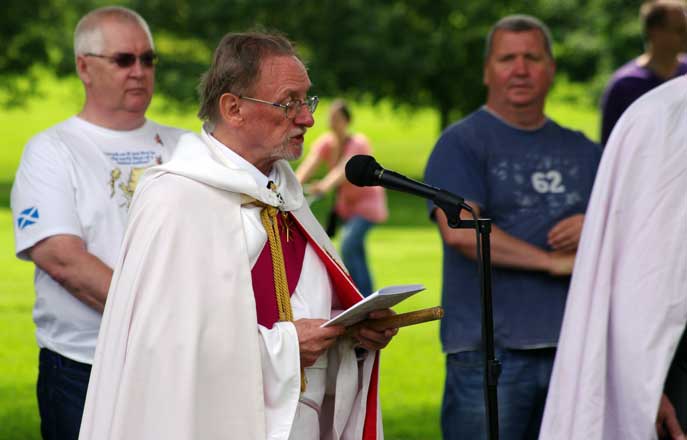 |
Ken Shirra |
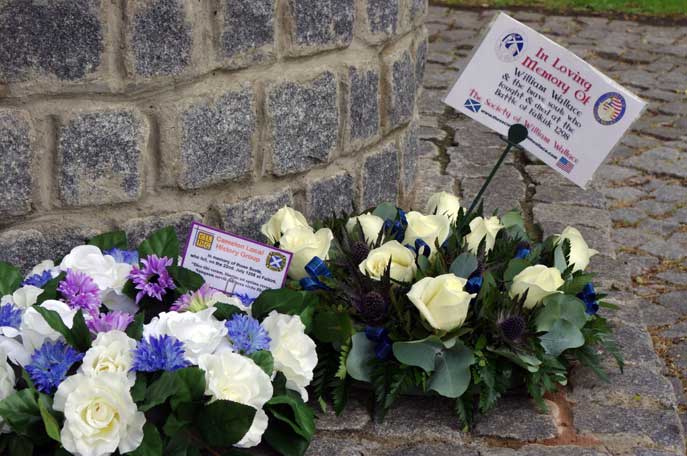 |
Society Wreath |
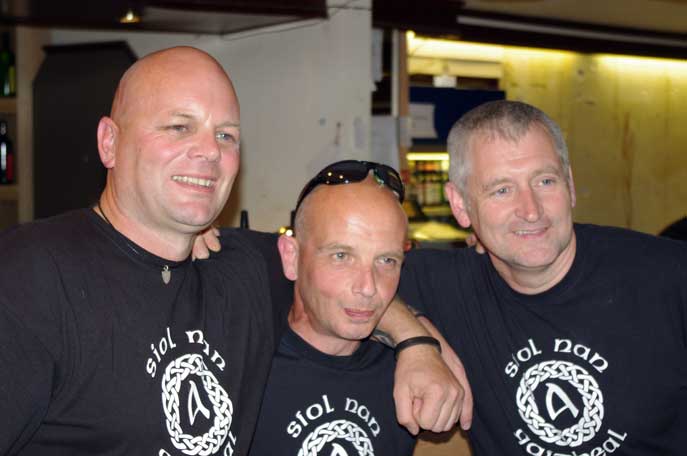 |
Some of the Siol lads |
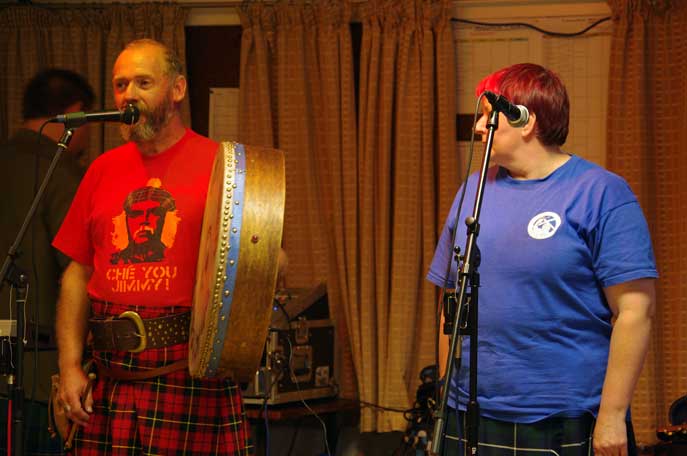 |
Gordon and Kate |
 |
Na Fir Dileas |
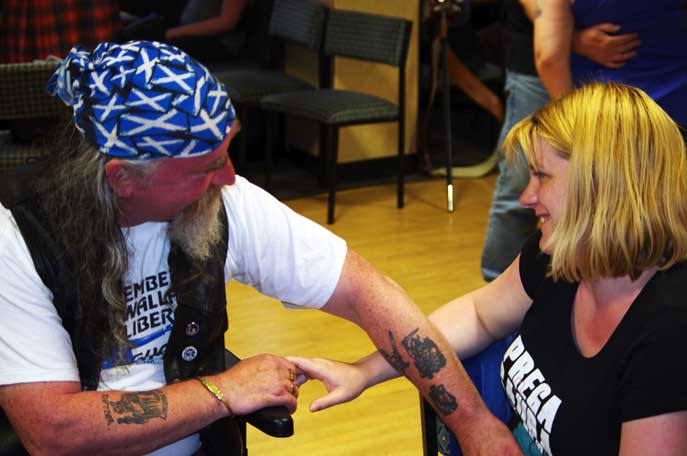 |
Amber and Lachlan |
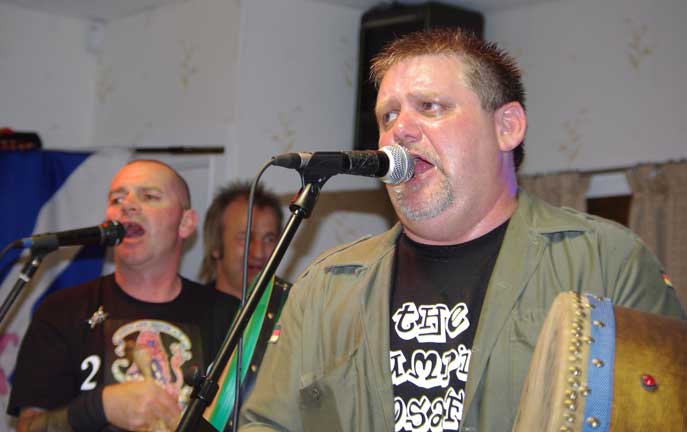 |
Fiery Jack |
.jpg) |
Stuck In The Middle Indeed. Thanks Kate xx |
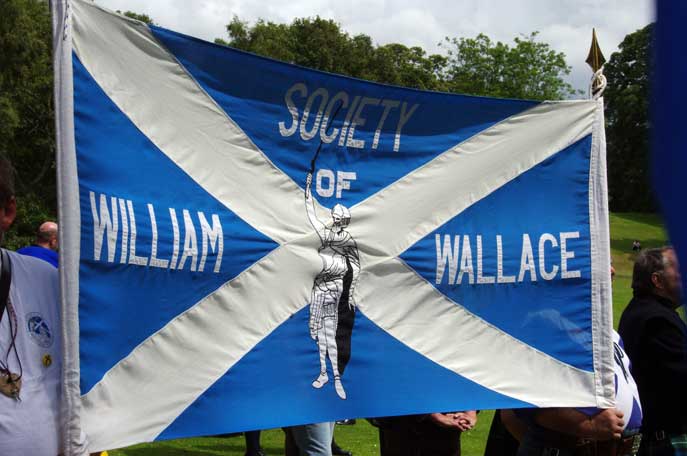 |
The Society Banner |
For higher resolution copies and lots more of these photos CLICK HERE |
| © Society of William Wallace 2007-2026 | The Society of William Wallace is a Scottish Charitable Incorporated Organisation Registration number SC045959 |
